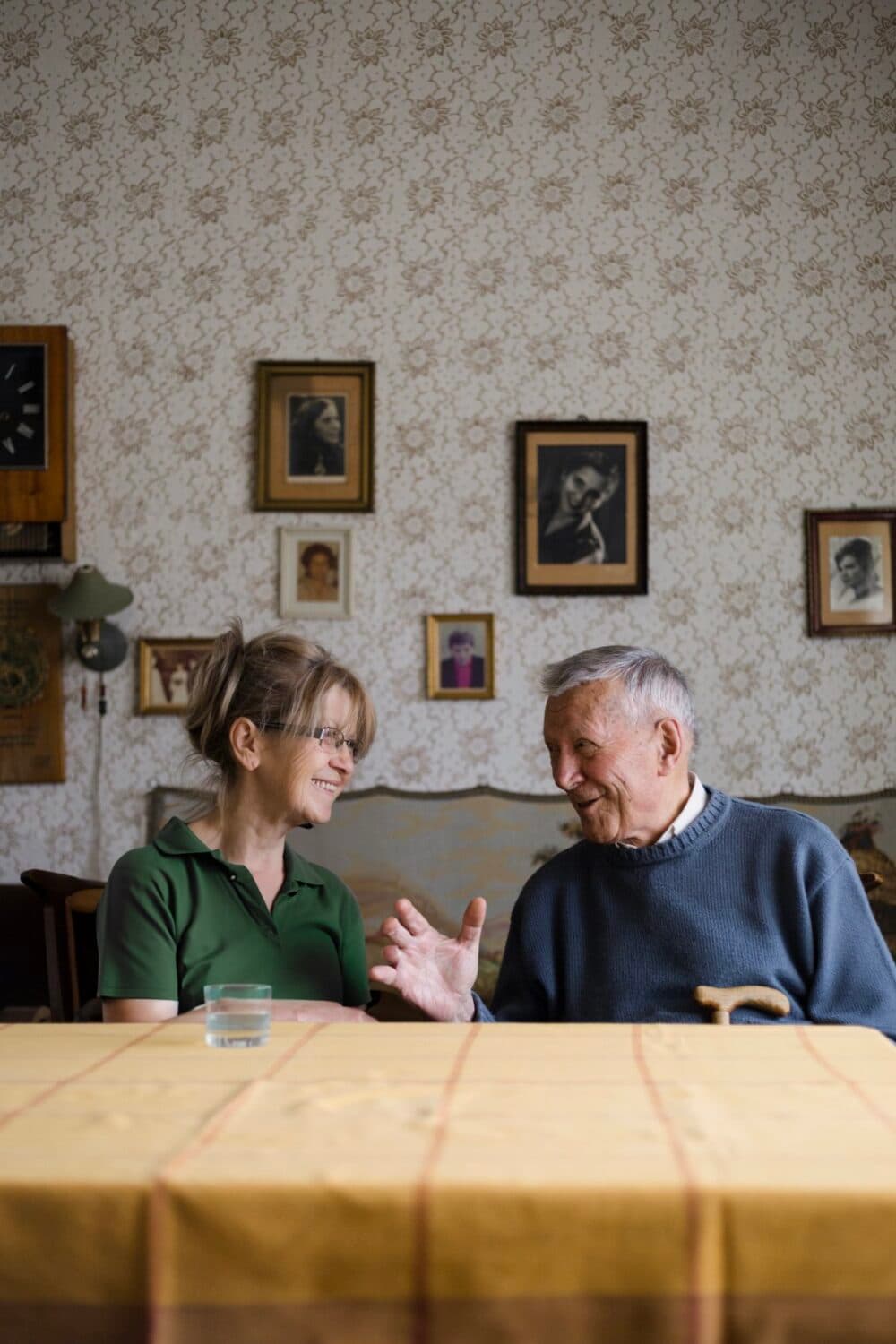Do People with Dementia Need 24-Hour Care? Understanding When More Help Is Truly Needed

How do you know when it's no longer safe for someone with dementia to stay at home?
It’s a question no one wants to face, yet many families eventually must. When someone you love is living with dementia or Alzheimer’s disease, there often comes a point when home-based support is no longer enough. Knowing when that moment arrives is never straightforward—and the decision to move towards 24-hour care can be clouded by uncertainty, worry, and a deep sense of guilt.
At Home Instead New Forest, we understand just how difficult this process can be. That’s why we’re here to offer clear, compassionate advice that can help you make an informed choice. Below, we outline the signs that 24-hour care may be necessary, the types of support available, and what you need to know when considering a move to residential care.

When Is Home No Longer the Right Place?
Dementia is a progressive condition. While early stages may involve only mild memory loss or confusion, later stages can bring serious risks—both to the individual and to those caring for them.
Some of the common signs that home may no longer be suitable include:
- Increasing difficulty with personal care – dressing, bathing, toileting, or eating without assistance
- Wandering or getting lost – even in familiar surroundings
- Forgetting to take medication or turn off appliances – which can pose serious safety concerns
- Aggression, paranoia or anxiety – making care harder for loved ones to manage
- Multiple hospital visits – due to falls, infections or other complications
- Signs of self-neglect – such as poor hygiene or not eating properly
If these issues are becoming more frequent—or if a sudden health crisis changes your loved one’s abilities overnight—it may be time to think about round-the-clock care.

The Emotional Toll on Family Carers
It’s natural to want to do everything possible to care for someone at home, especially when it’s a parent, spouse or close relative. But caring for a person with dementia can become physically and emotionally overwhelming, particularly without regular breaks or external help.
Signs of carer burnout can include:
- Constant tiredness
- Loss of interest in social activities
- Feelings of isolation or depression
- Irritability or emotional exhaustion
When the wellbeing of the main carer is affected, it’s not just the carer who suffers—the safety and stability of care at home may also be at risk. Recognising these signs isn’t a sign of failure. It’s a signal that more help may be needed.

What Does 24-Hour Dementia Care Involve?
Whether it’s delivered in a care home or through a professional live-in service, 24-hour dementia care ensures that someone is always available to help—day or night.
Support typically includes:
- Help with personal care – such as bathing, dressing, eating and toileting
- Monitoring of medication and diet – ensuring routines are maintained and health needs met
- Mobility support and fall prevention – especially important as balance and coordination decline
- Behavioural support – particularly for those experiencing anxiety, aggression, or confusion
- Night-time assistance – for those prone to waking, wandering, or sundowning
This level of consistency can be difficult to provide at home, even with the support of local services. A residential care setting can offer the structure and supervision many families find hard to maintain alone.

Residential Care Options for People with Dementia
When 24-hour care becomes necessary, there are several types of long-term care settings available in the UK. The right option depends on your loved one’s stage of dementia, personal preferences, and care needs.
Retirement Housing
Designed for older adults who are still largely independent, these settings offer security, communal spaces, and basic support—but they are rarely suitable once dementia progresses beyond the early stages.
Assisted Living (Supported Living)
This option provides meals, accommodation, and help with personal care, though not all providers specialise in dementia. It may work for those in the mid-stages, but as care needs increase, a transition to more specialist settings is often needed.
Nursing Homes
These facilities are staffed by registered nurses and trained care assistants, offering medical and personal care 24 hours a day. Some specialise in dementia care, while others may have dedicated units.
Dementia-Specific Care Units
Sometimes referred to as Memory Care or Alzheimer’s Special Care Units, these are purpose-built to meet the needs of people with dementia. Features often include secured environments, adapted routines, and staff trained in dementia behaviours.
Life Plan Communities
These allow residents to transition between independent living, assisted living, and nursing care as their needs change. Though more common in the US, some similar models exist in the UK.

Choosing the Right Care Home: Questions to Ask
When visiting potential care homes, don’t be afraid to ask detailed questions. Look for signs that staff are experienced, compassionate, and focused on the individual.
Family Involvement
- Will we be involved in care planning?
- How are families kept updated?
- Can we visit freely or join meals?
Staff and Training
- Are staff trained specifically in dementia care?
- What is the staff-to-resident ratio?
- Is there on-site medical support?
Activities and Routines
- Are daily activities personalised?
- Are there weekend or evening options?
- Are therapies or sensory activities available?
Environment and Safety
- Are indoor and outdoor spaces secure and easy to navigate?
- Can residents personalise their rooms?
Food and Nutrition
- Are meals freshly prepared and suited to individual needs?
- Is help available at mealtimes?
Policies and Planning
- What is the admissions process like?
- How does the home handle changes in care needs?
- Is end-of-life care provided?

Funding and Costs
Care costs can vary depending on the type of care and location. While the figures shared in some global sources reference US pricing, UK families often self-fund or use a mix of financial support.
Funding options in the UK may include:
- Local Authority Support – based on a means-tested assessment
- NHS Continuing Healthcare – for individuals with complex medical needs
- NHS-Funded Nursing Care – if living in a nursing home
- Charitable Grants – for those with limited resources or specific backgrounds
It’s worth speaking to a financial adviser or social worker and establishing a Lasting Power of Attorney if one isn’t already in place.

Making the Transition
No matter how prepared you are, moving a loved one into care is a significant change. Feelings of sadness, loss, and guilt are common—but they don’t mean you’ve made the wrong decision.
Where possible, involve your loved one in the process. Visit several care homes, speak with staff and current residents’ families, and review online feedback or CQC reports.
Remember: this is not just a practical decision—it’s a deeply personal one.

Supporting You Every Step of the Way
At Home Instead New Forest, we provide thoughtful, tailored support to families caring for someone with dementia. Whether you’re exploring live-in care at home or need guidance on the transition to residential care, our team is here to help.
Call us for a confidential chat or visit homeinstead.co.uk/new-forest to learn more about our local services. You don’t have to make these decisions alone—and with the right support, the next chapter can still be filled with connection, dignity, and peace of mind.

Areas We Serve
Lymington, Brockenhurst, New Milton, Totton, Lyndhurst & the surrounding areas.
BH23 8, BH24 4, BH25 5, BH25 6, BH25 7, SO40 2, SO40 3, SO40 4, SO40 7, SO40 8, SO40 9, SO41 0, SO41 3, SO41 5, SO41 6, SO41 8, SO41 9, SO42 7, SO43 7, SO45 1, SO45 2, SO45 3, SO45 4, SO45 5, SO45 6
5 Rashley Mews, High St, Lymington SO41 9AR, UK
01590 637 250